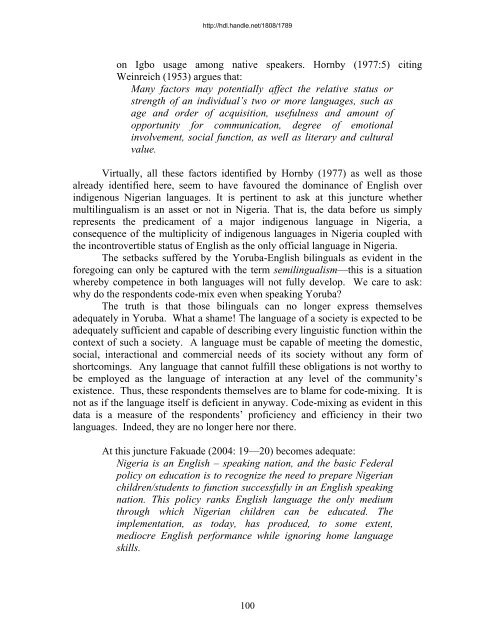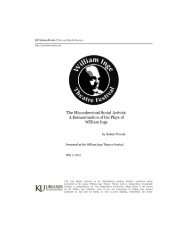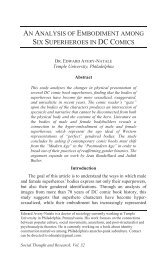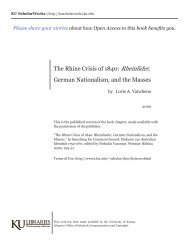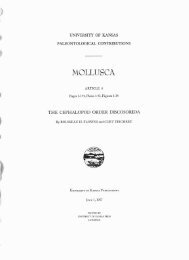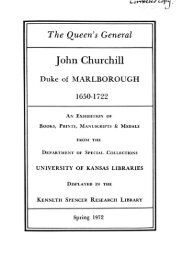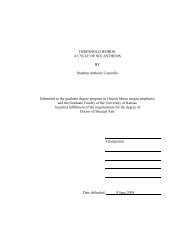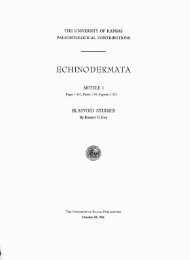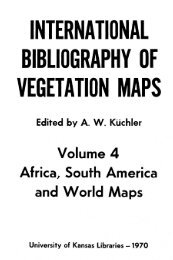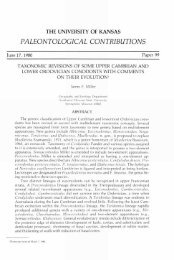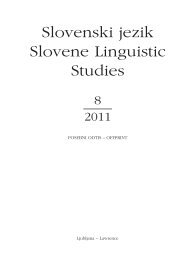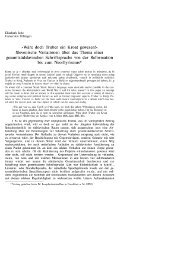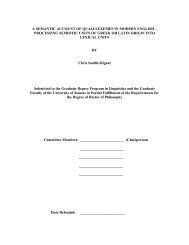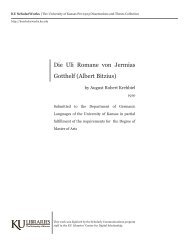LANGUAGE CONTACT AND LANGUAGE ... - KU ScholarWorks
LANGUAGE CONTACT AND LANGUAGE ... - KU ScholarWorks
LANGUAGE CONTACT AND LANGUAGE ... - KU ScholarWorks
You also want an ePaper? Increase the reach of your titles
YUMPU automatically turns print PDFs into web optimized ePapers that Google loves.
http://hdl.handle.net/1808/1789<br />
on Igbo usage among native speakers. Hornby (1977:5) citing<br />
Weinreich (1953) argues that:<br />
Many factors may potentially affect the relative status or<br />
strength of an individual’s two or more languages, such as<br />
age and order of acquisition, usefulness and amount of<br />
opportunity for communication, degree of emotional<br />
involvement, social function, as well as literary and cultural<br />
value.<br />
Virtually, all these factors identified by Hornby (1977) as well as those<br />
already identified here, seem to have favoured the dominance of English over<br />
indigenous Nigerian languages. It is pertinent to ask at this juncture whether<br />
multilingualism is an asset or not in Nigeria. That is, the data before us simply<br />
represents the predicament of a major indigenous language in Nigeria, a<br />
consequence of the multiplicity of indigenous languages in Nigeria coupled with<br />
the incontrovertible status of English as the only official language in Nigeria.<br />
The setbacks suffered by the Yoruba-English bilinguals as evident in the<br />
foregoing can only be captured with the term semilingualism—this is a situation<br />
whereby competence in both languages will not fully develop. We care to ask:<br />
why do the respondents code-mix even when speaking Yoruba?<br />
The truth is that those bilinguals can no longer express themselves<br />
adequately in Yoruba. What a shame! The language of a society is expected to be<br />
adequately sufficient and capable of describing every linguistic function within the<br />
context of such a society. A language must be capable of meeting the domestic,<br />
social, interactional and commercial needs of its society without any form of<br />
shortcomings. Any language that cannot fulfill these obligations is not worthy to<br />
be employed as the language of interaction at any level of the community’s<br />
existence. Thus, these respondents themselves are to blame for code-mixing. It is<br />
not as if the language itself is deficient in anyway. Code-mixing as evident in this<br />
data is a measure of the respondents’ proficiency and efficiency in their two<br />
languages. Indeed, they are no longer here nor there.<br />
At this juncture Fakuade (2004: 19—20) becomes adequate:<br />
Nigeria is an English – speaking nation, and the basic Federal<br />
policy on education is to recognize the need to prepare Nigerian<br />
children/students to function successfully in an English speaking<br />
nation. This policy ranks English language the only medium<br />
through which Nigerian children can be educated. The<br />
implementation, as today, has produced, to some extent,<br />
mediocre English performance while ignoring home language<br />
skills.<br />
100


